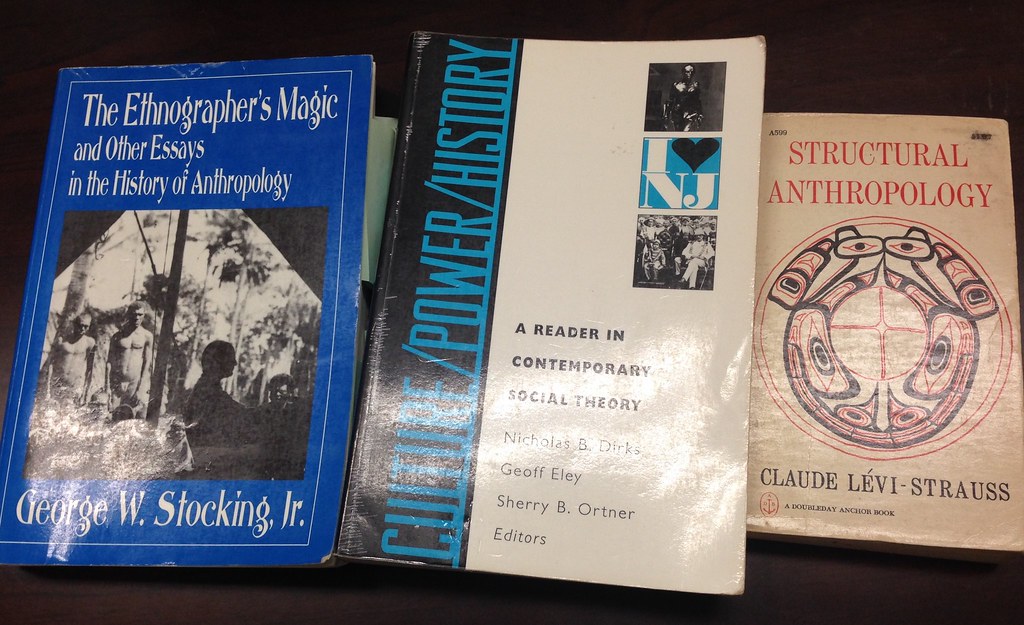
1967 “Introduction:
History and Anthropology,” in Structural
Anthropology, pp:1-28. Garden City: Anchor Books.
Ortner, Sherry B.
1994 “Theory
in Anthropology since the Sixties,” in Culture/Power/History:
A Reader in Contemporary Social Theory. Princeton: Princeton University,
Dirks, Nicholas, Geoff Eley, Sherry B. Ortner ed., pp372-411. Press.
Stocking, George W., Jr.
1992 The Ethnographer’s Magic and Other Essays
in the History of Anthropology. Madison: The University of Wisconsin
Press. (ch1, 8, conclusion)
請修課同學在「意見欄」裡留下閱讀心得
2 則留言:
其實這個禮拜念完讀本沒有什麼心得(除了李維史陀很強辨),所以就分享一下以Stocking為主的筆記,人類學(民族誌和民族學)作為學科的歷史筆記。
有比較八股的問題:Ethnographer's magic 寫在1992年,當時在芝加哥大學研究所訓練中,已經有的反思(人類學作為殖民工具和田野空間定義的改變),在20年後的台灣學院訓練延續了哪些問題?
Stocking’s CH8
1800-Pre-darwinian 19th century:
‘focal anthropological issues was posed by the explosion of the data of human diversity that was produced by European expansion…is mankind one or many’ (stockings 350)
1850- Darwinian evolution和national anthropological differentiation:
still heavily influence by positivist natural science. 出田野採集證據來作証理論的影響,根據Notes and Queries (1874) to ’arrange such present synchronic data on a diachronic scale’ (351) allowing ‘armchair anthropologist to construct generalised stage-sequent of development in each area of human culture’ ex. E.B Tyler 1871
(for details on from missionaries to academic natural scientists (zoology) and Haddon in the Torres Strait [1888-1899] go to ch1, p.19-26)
US 1890-1910: Critique of evolutionism in American cultural anthropology
led by Franz Boas, followed by Kroeber, Ruth Benedict(Patterns of culture 1934), Edward Sapir (1916) see culture as pluralistic, relativistic and largely freed from biological determinism(353)
anthropology was of ‘four fields’ physical anthropology, linguistics, archeology, ethnology (by 1930s is cultural anthropology)
UK 1910-1930 Fieldwork, Functionalism, British social anthropology
US fieldwork by train, UK fieldwork weeks on sea
James Frazer, Haddon, Rivers, Radcliffe-Brown, Malinowski
(for Haddon’s intensive method and River’s concrete method go to Ch1 p.27-36)
1930s Malinowski’s mythic charter and archetypical fieldworker:
‘ the gap between the specific methodological prescriptions of fieldwork and the vaguely defined goals of ethnographic knowledge had been filled by what Malinowski calls “ethnographer’s magic”(p.59)
1924-1965: classical period
fieldwork became the certifying criterion of membership in the anthropological community, participant observation. (357)
1960s the crisis and reinvention of anthropology, self-reflexivity and positionally
-to continue with Sherry Ortner’s article
60s symbol, nature, structure: symbolic anthropology, cultural ecology, structuralism
70s Marx: structural marxism, political economy
80s practice
Going on from Ortner's article along with what Ena has already mentioned above (as well as taking into account what we will be reading in this semester's Cultural Theories course), I find myself wondering about what would characterise anthropological theory since the time of the article's publication, which was in the 1980s. If, at that time the discipline of anthropology was already being seen as 'coming apart' and no longer possessing a shared discourse, how about now? Does the way forward mean more interdisciplinary approaches?
張貼留言